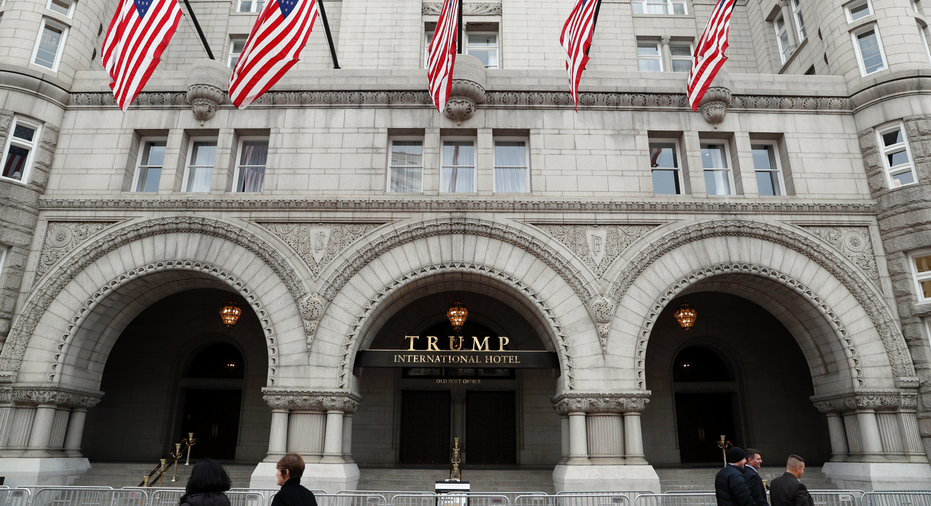Judge hints at taking up Trump foreign payments case

GREENBELT, Md. – A federal judge in Maryland hinted Thursday that he may take up a case questioning whether President Donald Trump's business empire violates the "emoluments" clause of the Constitution.
U.S. District Judge Peter Messitte expressed skepticism about the government's defense of the president's handling of his expansive business interests. If the case is allowed to proceed, it could reveal much about Trump's business and personal finances, possibly forcing him to reveal tax and other financial information in the course of legal discovery.
Thursday's five-hour hearing in a D.C. suburban courthouse dealt with the Trump administration's motion to dismiss a case brought by the attorneys general of the District of Columbia and Maryland. The lawsuit is one of several recent cases challenging Trump's ties to his business ventures, and his refusal to divest from them.
The legal cases have alleged that foreign governments' use of the Trump International Hotel in Washington and other Trump Organization properties violates the Constitution's emoluments clause, which bans the president's acceptance of foreign gifts and money without Congress' permission. The clause has never been fully tested in federal court and Trump's Justice Department attorneys have argued that hotel room stays do not represent "foreign gifts."
Last month, Judge George B. Daniels of the Southern District of New York dismissed a case brought by the left-leaning public policy group Citizens for Responsibility and Ethics in Washington, representing competing restaurateurs, hotel owners and others in the industry. Daniels said the plaintiffs could not show they were specifically harmed by the president's businesses and the issue needed to first be taken up by Congress. CREW is also co-counsel on the Maryland-D.C. case.
Messitte said he had carefully read Daniels' ruling, but found "there's very little analysis in his opinion." Messitte added, "I'm not really bound by the logic of his opinion at all at this point, with all respect to Judge Daniels."
The Maryland and D.C. case, however, also adds a slightly different twist on another section of the emoluments clause that ensures that no U.S. state is given extra favor by the president.
District of Columbia Deputy Solicitor General Loren AliKhan cited "The Federalist Papers: No. 73" by Alexander Hamilton, a document that addresses the domestic emoluments clause, which was created "to prevent states from corrupting the president's integrity by appealing to his avarice." AliKahn cited the use of Trump's Washington hotel last year by representatives of the governments of Saudi Arabia, Bahrain and Kuwait as examples of possible emoluments.
In both the New York case and this one, Justice Department lawyers have argued that the plaintiffs did not suffer "certain" or "imminent" injury and therefore had no standing to sue, and that it is unconstitutional to sue the president in his official capacity.
Given the early stage of the case, Messitte said, the plaintiffs weren't expected to have all the evidence of injury that might come with discovery, and the burden to get the case dismissed was on the government.
"For me to grant your motion at this stage, I'd have to say it's implausible as a matter of law," Messitte told government lawyers.
Justice Department attorney Brett Shumate of the Civil Rights Division argued that Trump is not receiving any foreign emoluments because they could only come in his capacity as president. And Shumate criticized the plaintiffs' arguments as "inherently speculative."
"It does not reach benefits arising from commercial transactions engaged by businesses in which the President has a financial interest," the government said in its motion to dismiss the case.
But Messitte, who was nominated to the federal bench in 1993 by President Bill Clinton, was openly troubled by that distinction, asking Shumate, "Getting payments from a foreign organization — is that an executive action?"
Messitte said it's "not challenging a presidential function. They're challenging the president as an individual."
Mark Brown, a professor and constitutional law expert at Capital University Law School in Columbus, Ohio, who co-wrote a textbook on the issue of individual versus official capacity, said the judge's actions show that he sees the nuances in the law.
"With the president we're just not sure he can act without color of authority, everything he does is on the clock, he's always president. He may not have a personal capacity (to sue under)," Brown said. "It's really hard to sue the president for anything, we're not sure you can do that. So maybe the way is to go after him in his personal capacity."
It's unclear how adding the president in his personal capacity may affect the case; Brown said these are uncharted legal waters. In 1982, the U.S. Supreme Court decided in Nixon v. Fitzgerald that the president is immune from prosecution in a civil suit and could not be held liable for damages "predicated on his official acts."
D.C. Attorney General Karl Racine told The Associated Press that the plaintiffs are "prepared to amend" their claim to include Trump as an individual, in order to proceed further. "Obviously the judge's interest in this question as to whether to amend (to include the president as an individual) suggests an interest in our action."
The judge already granted a request from the two attorneys general last November ordering 23 Trump businesses, including his Florida estate, Mar-a-Lago, to retain records. Those documents would include all materials that relate to direct or indirect payments made by any foreign or domestic government to Trump businesses dating as far back as Jan. 1, 2015.
___
Follow Tami Abdollah at https://twitter.com/latams



















